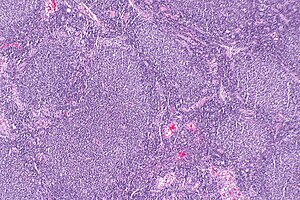Follicular lymphoma
| Follicular lymphoma | |
|---|---|
 |
|
| Micrograph of a follicular lymphoma, showing the characteristically abnormal lymphoid follicles that gave the condition its name. H&E stain. | |
| Classification and external resources | |
| Specialty | Hematology and oncology |
| ICD-10 | C82 |
| ICD-9-CM | 202.0 |
| ICD-O | M9690/3 |
| OMIM | 151430 |
| eMedicine | med/1362 |
| MeSH | D008224 |
Follicular lymphoma is a type of blood cancer. It is the most common of the indolent (slow-growing) non-Hodgkin's lymphomas, and the second-most-common form of non-Hodgkin's lymphomas overall. It is defined as a lymphoma of follicle center B-cells (centrocytes and centroblasts), which has at least a partially follicular pattern. It is positive for the B-cell markers CD10, CD19, CD22, and usually CD20, but almost always negative for CD5.
There are several synonymous and obsolete terms for this disease, such as CB/CC lymphoma (Centroblastic and Centrocytic lymphoma), nodular lymphoma and Brill-Symmers Disease.
The tumor is composed of follicles containing a mixture of centrocytes (Kiel nomenclature adopted by WHO experts) or cleaved follicle center cells (older American nomenclature), "small cells", and centroblasts (Kiel nomenclature adopted by WHO experts) or large noncleaved follicle center cells (older American nomenclature), "large cells". These follicles are surrounded by non-malignant cells, mostly T-cells. In the follicles, centrocytes typically predominate; centroblasts are usually in minority. Peripheral smear will also reveal .
According to the WHO criteria, the disease is morphologically graded into:
Grade 3 is further subdivided into:
The WHO 2008 update classifies grades 1 and 2 now as low grade follicular lymphoma, grade 3A as high grade follicular lymphoma, and grade 3B as Diffuse Large B Cell Lymphoma (DLBCL).
A translocation between chromosome 14 and 18 results in the overexpression of the bcl-2 gene. As the bcl-2 protein is normally involved in preventing apoptosis, cells with an overexpression of this protein are basically immortal. The bcl-2 gene is normally found on chromosome 18, and the translocation moves the gene near to the site of the immunoglobulin heavy chain enhancer element on chromosome 14.
...
Wikipedia
